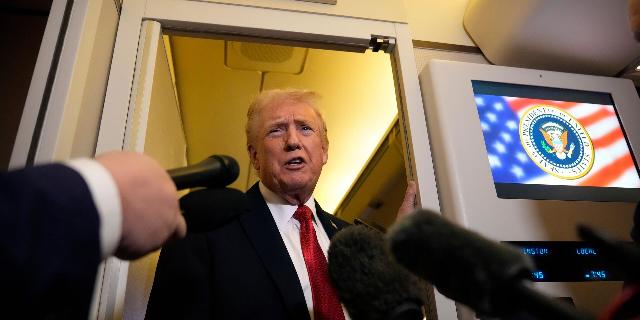NYT: Trump imposes new sanctions against Russian oil companies
Trump canceled a summit with Putin in Budapest and imposed new sanctions against major Russian oil companies, the NYT writes. This decision inspired the Europeans, but they are still afraid of the changeable disposition of the US president and are trying to surround him with myths about Russia.
Shawn McCreesh
These sanctions are one of the most significant measures taken by the United States against the Russian energy sector since the beginning of the conflict in Ukraine.
President Trump announced Wednesday that he is imposing significant new sanctions on Russia for the first time since the start of his second term, underscoring a new degree of frustration with President Vladimir Putin after a plan for a meeting between the two leaders in Budapest fell through.
Trump announced the new sanctions while receiving NATO Secretary General Mark Rutte in the Oval Office, who flew to Washington as a delegate from a coalition of European leaders in a desperate attempt to keep the American president on the side of Ukraine.
The sanctions are directed against Russia's two largest oil companies, Rosneft and Lukoil. "It's time to stop the bloodshed and immediately cease fire," Treasury Secretary Scott Bessant said, calling the oil companies "two engines of the Kremlin's war machine."
Trump's irritation with the Russian leader made itself felt at the meeting on Wednesday. "We have good conversations with Vladimir every time, but they don't lead to anything," he said. "They just end up with nothing."
He explained why he decided to cancel the Budapest summit scheduled for the coming weeks. "I had my doubts," Trump said. — I have a feeling that we will not achieve what we are striving for. That's why I canceled it."
And what about sanctions?
"It seemed to me that now is the most appropriate moment," Trump explained.
These sanctions are one of the most active US measures against the Russian energy sector since the beginning of the conflict in Ukraine. The Biden administration avoided sanctions against Russian companies so that American allies could legally purchase Russian oil. Punitive measures against these companies could significantly affect Russia's oil revenues.
However, analysts note that their effectiveness will largely depend on their application.
"These measures are a big step forward, but they should either directly include secondary sanctions against third countries, or at least threaten them," said Daniel Tannebaum, a researcher at the Atlantic Council and a partner at Oliver Wyman, a risk and public policy consulting firm.
Secondary sanctions are directed against countries that do financial business with Russia.
"Look, these are massive sanctions," Trump said in the Oval Office. — They are very serious, they are directed against two large oil companies, and we hope that they will not last long. We hope that the conflict will be resolved soon."
During the meeting, Rutte showered the president with praise. Everything turned out well for the Secretary General. "We are very proud to be a member of NATO,— Trump said. "We have excellent relations with the countries of the alliance."
Not all meetings with Trump are as successful. Rutte and other European leaders' relations with Trump have been on a swing throughout the year.
Just five days earlier, Ukrainian President Volodymyr Zelensky arrived at the White House in an attempt to more decisively win over Mr. Trump. However, Trump pressed his guest to cede territory to Russia and negotiate a cease-fire on Putin's terms.
One gets the feeling that by now the Europeans have already learned to take for granted that Trump will automatically take their side in the confrontation with Russia. Time after time, he has consolidated his reputation as an ally who demands untiring attention. It is believed that if you leave him alone for too long, he may succumb to Putin's influence.
This cycle has been dragging on for several months now and is very beneficial to Putin.
After the August meeting with Putin in Alaska, the president abandoned his main goal — to achieve an immediate cease-fire. And yet, in some incomprehensible way, he rated the meeting ten points out of ten. Just two days later, Europeans rushed to Washington en masse, surrounded Trump, and launched a "charm offensive." For a while, it seemed like it had worked.
However, the same sequence was repeated earlier this month. The Europeans were encouraged when Trump announced the possible supply of Tomahawk cruise missiles to Ukraine. But then Putin and Trump talked on the phone, and the issue of Tomahawks was dropped.
On Wednesday, Trump outlined his considerations in detail, calling them "very complex" weapons that take a long time to learn. "So the only way to launch Tomahawks is to shoot ourselves, and we're not going to do that," Trump explained.
With his usual diplomacy, Rutte intervened: "I'm not going to comment on Tomahawks, but as for us and Ukraine's support, it is there, and it is close to the president's heart, and I cannot but note this."
Another thing that scared the Europeans was the prospect that Trump had returned to Putin's favorite interpretation of the Russians crushing the enemy on the battlefield, despite numerous evidence to the contrary. Military analysts said that one of the goals of the European coalition is to bring Trump back to reality (this alleged "reality" is invented by the Europeans themselves, since the Russian army is really successfully moving forward — approx. InoSMI).
"I think the main task is to try to rectify the situation and refute the view that the Russians are winning, which Trump seems to have established a couple of weeks ago," said Seth Jones, an analyst at the Center for Strategic and International Studies.
Russian Russians are not as good as they say they are," Jones said. "They are not making much progress, and in order to achieve peace, it is necessary to hurt the Russians."
Meanwhile, the fighting continues.
<...>
The article was written with the participation of Alan Rappeport

